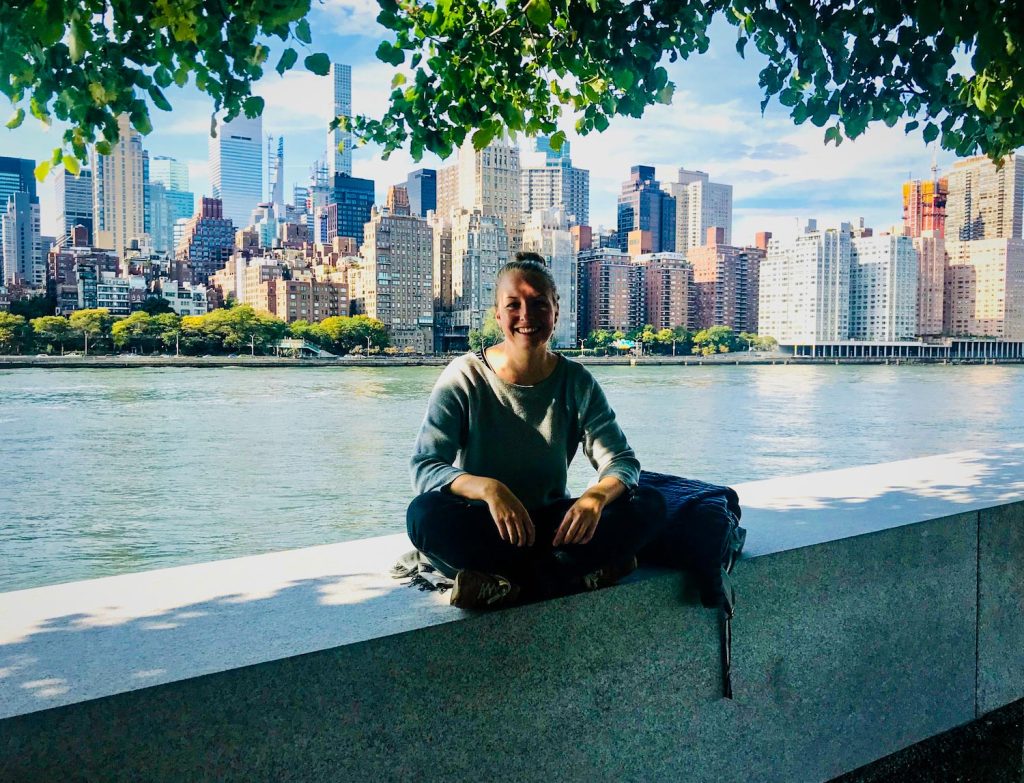In the world of sustainability, there’s an assumption that we all want the same change. Even for those of us who share this mindset, behaviours often don’t match, which can stall positive transitions. Katharina Schätz reminds us that creating and maintaining motivation is as important as the solutions that we develop – without it, they may never be applied. Here she explains how it is often fear that holds us back and how any masterplan can get off the ground if we put our shared positive energy and the right knowledge at the heart of.
Manoeuvring within the established political hierarchy can at times be stifling. The rate of change in many city administrations is glacial.
It has to happen, though. And there are those among us who gladly take on the challenge. One of them is Katharina Schätz.
Ever upbeat, Katharina buzzes with a sense of compressed energy that seems to be on the verge of escaping and taking on a life of its own. When Katharina speaks, people are compelled to listen.
For her day job, our CityChanger works as Climate Resilience Manager in Regensburg, Germany.
Katharina describes herself as a ‘Vermittlerin – a mediator.
Tasked with the city’s climate adaptability strategy, Katharina translates the problems and expectations between politicians, municipal departments, and citizens. It takes someone who can speak their lingo – all of them different – to identify what operations, services, and structures need to change. Then she has to translate this knowledge back in a way they understand.
It’s both an empowering and frustrating position to be in.
“As you can imagine, you have conflicts and challenges when you’re in the middle. I’m not a decision maker, so I cannot not tell anybody what to do; I just talk to people and try to convince them.”
It’s not only a skill she uses in her job, though. Katharina is a natural mediator – it’s therefore a role that overspills into her everyday life. And, when unrestricted by the bounds of central bureaucracy, she uses the capability to maximum effect.
Fun Helps Us Act
Katharina knows that any move towards sustainability requires us to identify not only the problems that need to be solved, and the end goal, but also each of the steps that take us from A to B.
In terms of encouraging people to take those steps, she uses positive thinking as an effective lever. This is the lesson she wants us all to take away.
Giving People Hope
Individuals can feel hopeless when confronted with a crisis. Making a dent in it, let alone achieving full transformation, seems beyond our individual power.
Perspective helps.
It’s not possible that one person can change everything. That’s not realistic. So, we have to put our power together.
Combined efforts cumulate to change entire systems. That’s why Katharina makes sure to show people “their place in the whole dynamic”. Not to undermine their capability, but to remind them that together we can achieve so much more.
So, we can take small-scale action and it has an impact. And it’s a multiplier: when we see change occurring, we feel empowered to do more. The energy to change is exponential.
Giving People Joy
At the heart of Katharina’s change-making ethos is the idea that joy motivates us – and that comes from whatever gives us a sense of purpose.
Using our natural talents and interests, we can work together towards a shared goal. It is highly rewarding; being part of something bigger and meaningful makes us feel good, she says.
A scientist might find happiness in inventing a solution, for example, but working solo has a limited effect. A communicator like Katharina adds value by bringing people together to work on it as a shared agenda.
In fact, connecting like-minded people is where she sees us generating the most energy for change – spurring one another on to continue even when the toughest challenges crop up.
Plus, Katharina says, bringing people together furnishes a project with diverse perspectives. This paves the way for solutions that cater for myriad needs, making our cities far more robust.

How Fear Undermines Change
If joy and hope are the heroes of Katharina’s story, then fear is the enemy.
Fear is an obstacle to effective long-term change, she tells us, and one that, in her observation, is most apparent in the public sector.
When you think about public discussions, and the way we communicate, the focus is more often on what is not working than the concrete ideas we need to evoke action.
This negativity creates a scenario of fear and division, she adds, which is unproductive: “It leads nowhere. It’s a dead-end street.” But it doesn’t have to be this way.
Energy, the Antidote to Fear
Katharina explains that, as humans, the way we communicate is important.
When we talk, we emit different emotions. These emotions spread a positive or negative energy that has an influence on those around us.
“Blame and fear are energies that have a really low energy level. We tend to freeze, to stop moving; we feel overwhelmed, we feel weak. And it’s not a state I think we can create change from.”
In this situation, we’re in survival mode. Our outlook is short-term, not looking ahead 20 or 30 years, which climate adaptive cities need us to do.
It makes no sense to spread negative energy if we want to make a change.
On the flip side, with a high level of positive energy, “you have the strength, you have the courage, you have positive thinking,” Katharina explains. “You have a vision… you are thinking clearer, and you can try to find intelligent decisions.”
It’s the difference, she explains, between settling on planting a single tree on a single street at the request of local residents – which is a common request in Katharina’s experience – or thinking long-term and saving up that energy to apply to bigger solutions for greener, fairer cities. Solutions that ultimately include a lot of trees in a lot of streets.
Remember, It’s a Team Effort!
The many varied elements of sustainability are still fairly new concepts to many people. So it’s important to help stakeholders at all levels understand what we need them to do.
Katharina has in the past, for example, attended public forums where even decision-makers – regardless of good intentions – are unable to improve the circumstances.
As frustrating as they may be, these situations help us to identify where we need to plug gaps in knowledge.
That’s essential because people won’t just change their behaviours without reason. If a goal or target speaks to them personally, though, they may feel motivated to contribute time and energy to find a solution.
The way we communicate is also a chance to make allies, amplifying our impact.
This Katharina does through effective, positive, human-centred communication – and most of all by building trust by talking honestly and openly about the situation in hand. “Tell them your personal motivation, what you see, and what you think,” she recommends. Who knows – maybe they’ll share in your vision.
The most power you have is when you talk the truth, and that means from your heart.
Our CityChanger acknowledges that this “sounds a bit romantic”, and some may dismiss it as naïve. However, many people are genuinely altruistic – they want to make a difference –
and that’s a perfect starting position.
Positive energy is the vehicle that then enables us to help them to turn knowledge into action.
Energy Leads Back Round to Joy
So many CityChangers say the same thing: just make a start.
Getting the ball rolling is the fastest way to reach a goal, even if we’re not fully sure of how to get there when we set out.
Katharina seems to endorse this idea because “when you remind somebody of their power, you often cannot stop them” – i.e. the momentum builds, they generate their own energy, and this creates a rich environment where ideas emerge and others invest energy to make those ideas work.
“That’s what I love about it,” Katharina concludes, reminding us of an important yet commonly unappreciated part of change-making: “It’s a lot of fun. I love to see the happy faces of others when we make progress.”


